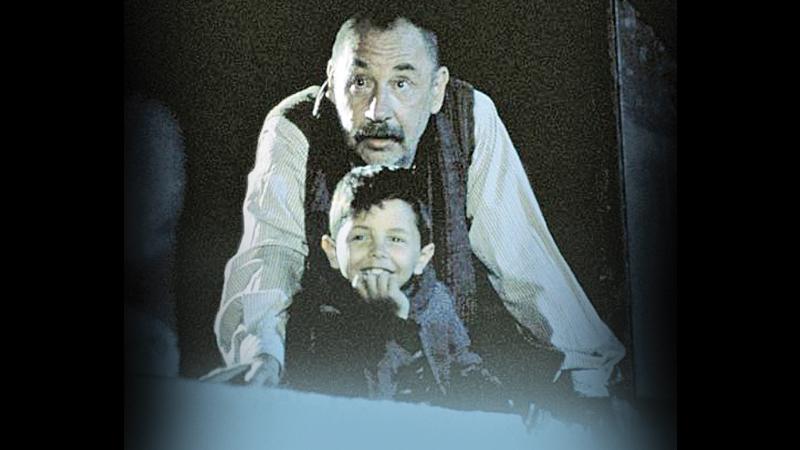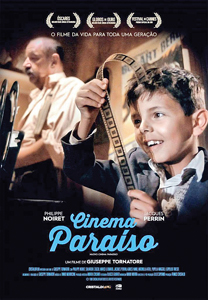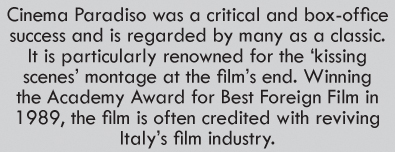
Cinema Paradiso is a 1988 Italian drama film written and directed by Giuseppe Tornatore. The plot of Cinema Paradiso is loosely based on the story of the Protti family, who have owned a movie theatre in Mantua, Italy, since 1904. The film stars Jacques Perrin, Philippe Noiret, Leopoldo Trieste, Marco Leonardi, Agnese Nano and Salvatore Cascio, and was produced by Franco Cristaldi and Giovanna Romagnoli, while the music score was composed by Ennio Morricone along with his son, Andrea. It won the Academy Award for the ‘Best Foreign Language Film’ at the 62nd Academy Awards. ‘

Cinema Paradiso was shot in director Tornatore’s hometown Bagheria, Sicily, as well as Cefalù on the Tyrrhenian Sea. The famous town square is Piazza Umberto I in the village of Palazzo Adriano, about 30 miles to the south of Palermo. The Paradiso cinema was built here, at Via Nino Bixio, overlooking the octagonal Baroque fountain, which dates from 1608. Told largely in flashback of a successful film director Salvatore to his childhood years, it also tells the story of the return to his native Sicilian village for the funeral of his old friend Alfredo, the projectionist at the local Cinema Paradiso. Ultimately, Alfredo serves as a wise father figure to his young friend who only wishes to see him succeed, even if it means breaking his heart in the process.
Seen as an example of “nostalgic postmodernism”, the film intertwines sentimentality with comedy, and nostalgia with pragmatics. It explores issues of youth, coming of age, and reflections (in adulthood) about the past. The imagery in the scenes can be said to reflect Salvatore’s idealised memories of his childhood. Cinema Paradiso is also a celebration of films; as a projectionist, young Salvatore (a.k.a. Totò) develops a passion for films that shapes his life path in adulthood.
Multiple versions
The film exists in multiple versions. It was originally released in Italy at 155 minutes, but poor box office performance in its native country led to its being shortened to 124 minutes for international release; it was an instant success. This international version won the Special Jury Prize at the 1989 Cannes Film Festival and the 1989 Best Foreign Language Film Oscar. In 2002, the director’s cut 173-minute version was released (known in the U.S. as Cinema Paradiso: The New Version)
Reception
 Cinema Paradiso was a critical and box-office success and is regarded by many as a classic. It is particularly renowned for the ‘kissing scenes’ montage at the film’s end. Winning the Academy Award for Best Foreign Film in 1989, the film is often credited with reviving Italy’s film industry, which later produced Mediterraneo and Life Is Beautiful. Film critic Roger Ebert gave it three and a half stars out of four and four stars out of four for the extended version, declaring “Still, I’m happy to have seen it--not as an alternate version, but as the ultimate exercise in viewing deleted scenes.”
Cinema Paradiso was a critical and box-office success and is regarded by many as a classic. It is particularly renowned for the ‘kissing scenes’ montage at the film’s end. Winning the Academy Award for Best Foreign Film in 1989, the film is often credited with reviving Italy’s film industry, which later produced Mediterraneo and Life Is Beautiful. Film critic Roger Ebert gave it three and a half stars out of four and four stars out of four for the extended version, declaring “Still, I’m happy to have seen it--not as an alternate version, but as the ultimate exercise in viewing deleted scenes.”
Review aggregator Rotten Tomatoes reports that 90 per cent of critics have given the film a positive review based on 78 reviews, with an average score of 8.00/10. The critics consensus reads, “Cinema Paradiso is a life-affirming ode to the power of youth, nostalgia, and the the [sic] movies themselves.” The film also holds a score of 80 based on 21 reviews on Metacritic, indicating ‘generally favourable reviews’. The film was ranked #27 in Empire magazine’s ‘The 100 Best Films Of World Cinema’ in 2010.
The famed ‘kissing scene’montage at the end of the film was used in Stealing First Base, an episode of The Simpsons that aired on March 21, 2010, during its twenty-first season. The scene used Morricone’s ‘Love Theme’ and included animated clips of famous movie kisses, including scenes used in Cinema Paradiso as well as contemporary films not shown in the original film. American progressive metal band Dream Theatre 1992 album Images and Words’s song Take the Time features in the lyrics the sentence spoken by Alfredo after the fire ora che ho perso la vista, ci vedo di più! (I can see much clearer now I’m blind)
